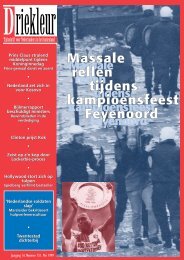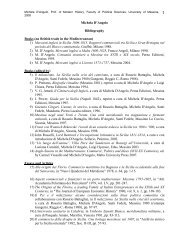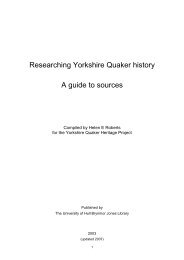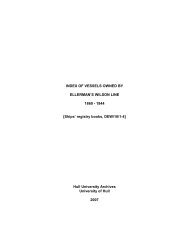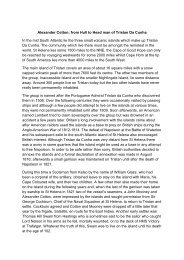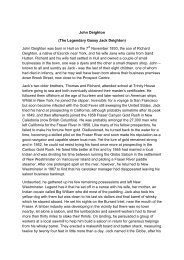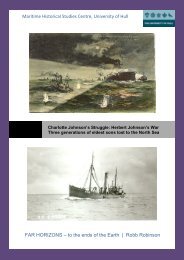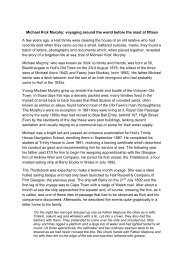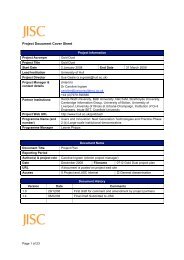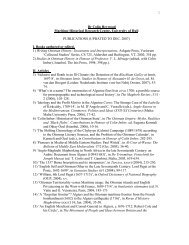The North Atlantic Fisheries, 1100-1976 - University of Hull
The North Atlantic Fisheries, 1100-1976 - University of Hull
The North Atlantic Fisheries, 1100-1976 - University of Hull
You also want an ePaper? Increase the reach of your titles
YUMPU automatically turns print PDFs into web optimized ePapers that Google loves.
good years around 1617-22. 334 Evidence from the neighbouring <strong>North</strong><br />
European countries concerning both cod and herring thus shows a<br />
significant drop in the price <strong>of</strong> fish relative to agricultural products from<br />
the late medieval to the early modern ages. In the Netherlands, the<br />
relative price fall was counterbalanced by expanding deep-sea catches<br />
from larger and more productive ships. In Denmark, fishermen were<br />
apparently unable to afford larger ships and were pushed out <strong>of</strong> the<br />
fishing sector by poor prices.<br />
On the capital side, we know that the noblemen withdrew their<br />
maritime investments to concentrate on agriculture and stockraising. 335<br />
<strong>The</strong>y also began a political battle to restrict the freedom <strong>of</strong> their peasants<br />
to fish and trade; while the King occasionally supported the freedom <strong>of</strong><br />
the peasants to leave their soil, the towns supported the noblemen. In<br />
South Zealand, the towns suffered because <strong>of</strong> the decline in the fish<br />
trade; in Stege, the citizens had their taxes redeemed in 1582, while their<br />
dues to the Crown were almost halved “because the fishery is so poor”. 336<br />
<strong>The</strong> town wanted to reduce peasant sailing in order to keep the transport<br />
<strong>of</strong> goods for themselves. <strong>The</strong> combined efforts <strong>of</strong> nobles and towns<br />
succeeded by a series <strong>of</strong> royal commands. 337 <strong>The</strong> prohibitions meant,<br />
however, that the peasants lost interest in keeping a boat altogether; they<br />
not only stopped trading but also fishing. Before 1600 they had been<br />
effectively bound to the land, and a strictly agricultural system had<br />
developed. <strong>The</strong> late-sixteenth century development <strong>of</strong> domain manors<br />
needed lots <strong>of</strong> manpower, and could not tolerate a haphazard loss <strong>of</strong> the<br />
workforce for two or three months in the harvesting period. If, or when,<br />
the herring returned in great numbers, there was only a small group <strong>of</strong><br />
pr<strong>of</strong>essional fishermen to catch it. <strong>The</strong> custom <strong>of</strong> recruiting crews from<br />
the surrounding agricultural areas had stopped, and economic interest<br />
had turned effectively away from the sea.<br />
Finally, we should consider the change in consumption habits which<br />
took place after the Reformation when ‘catholic practices’ such as the<br />
334 W. Bauernfeind, Materielle Grundstrukturen im Spätmittelalter und der Frühen<br />
Neuzeit: Preisentwicklung und Agrarkonjunktur am Nürnberger Getreidemarkt von<br />
1339 bis 1670 (Neustadt/Aisch, BRD: Schmidt Gmbh, 1993).<br />
335 Ladewig Petersen, Danmarks historie 2:2, 409.<br />
336 Stoklund, ‘Bonde og fisker’, 107.<br />
337 F. Martensen-Larsen, Hav, fjord og handel. En studie i handelsveje i Nordjylland i<br />
tiden indtil 1850 (Herning, 1986) 151 note 10.<br />
191



